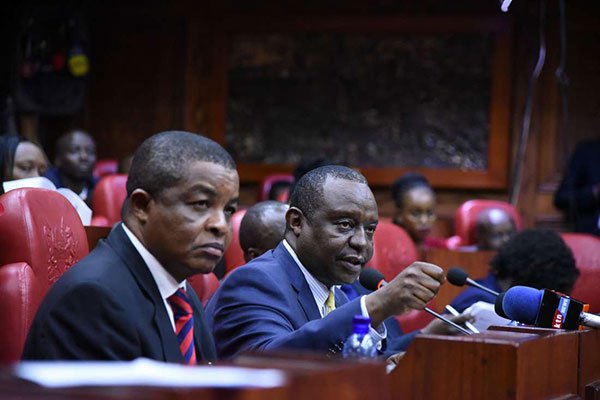Agriculture Cabinet Secretary Mwangi Kiunjuri on Monday accused Treasury of opening the floodgates allowing the dumping of 1.3 billion kilos of sugar into the market, effectively knocking millers out of business for a long time.
Mr Kiunjuri said Treasury, in an unprecedented move, allowed everyone, without a licence, to import as much sugar as they wished, of whatever quality and type.
This was in violation of the laid down procedure and previous practice which involves the Agriculture ministry advising Treasury which sugar is to be imported and in what quantities. The importers are also licensed.
It’s also definitely a violation of the law which provides that emergency duty imports must be done by government agents.
Mr Kiunjuri was testifying before a joint sitting of Agriculture and Trade, Industry and Cooperatives committees of the National Assembly investigating the entry into the Kenyan market of sugar feared to be contaminated with heavy metals like copper and lead.
EXECUTIVE ORDER
Through gazette notice No. 4536 of May 12, 2017, Treasury Cabinet Secretary Henry Rotich, apparently responding to a presidential executive order, lifted duty on sugar, maize and powder milk.
In the executive order, President Uhuru Kenyatta declared the prolonged drought in some parts of the country a national disaster.
The notice was to last until August 31, 2018, in line with the East African Community Customs Management Act of 2004. But by the time it was closed, about 1.3 million metric tonnes of the duty free sugar had been imported largely from the non-Comesa region.
Although it is not quote clear whether the lake region where sugar is grown was hard hit by the drought, the government gave permission for the importation of sugar all the same.
Kieni MP Kanini Kega chairs the Trade committee while Mandera South MP Adan Haji leads that of Agriculture. OPENED FLOODGATES Mr Kiunjuri told the joint sitting of the two committees that the gazette notice opened the floodgates for all, including those who are not licensed to import the commodity.According to Kiunjuri, the Ministry of Agriculture, through the Agriculture, Food, and Fisheries Authority (AFFA) only advises the Treasury on the quality and quantity to be imported as well as issue licenses to the traders.Whereas Treasury was to specify in the gazette notice the quality and tonnage as advised by the Agriculture ministry and required by the AFFA Act, this did not happen, a loophole that Mr Kiunjuri said was exploited by the importers.
